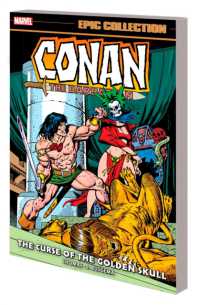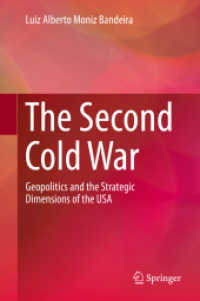- ホーム
- > 洋書
- > 英文書
- > Performing Arts
Full Description
Examining theatrical performance under Stalinist cultural mandates
Talk of Joseph Stalin's 'show trials,' the public prosecutions in Moscow's Hall of Columns in the late 1930s, is so familiar as to obscure the relationship between actual shows - in the Soviet Union's major theaters - and politics. Travesty Actors: Self and Theater in Stalinist Culture examines theatrical performance within the context of the Soviet cultural establishment's fashioning of a 'genuine Soviet person.' Boris Wolfson focuses on prominent and controversial plays by artists including Aleksandr Afinogenov, Mikhail Bulgakov, Yuri Olesha, and Natalia Sats and the efforts of theater companies, like the Moscow Arts Theater, the Meyerhold Theater, and the Central Children's Theater, to adhere to this cultural mandate while grappling with repression, censorship, and conflicting interpretations of its aims. Drawing on archival materials, diaries and memoirs and eyewitness accounts, Wolfson greatly illuminates the achievements of Soviet theater during this harsh period and the cultural significance of artistic theories and practices for articulating and enacting ideological programs.
Contents
Prefatory Note
Introduction
Chapter One: Travesties for Stalin's Children
Chapter Two: Yuri Olesha's Theatrical Experiment
Chapter Three: New Soviet Drama: Performing (for) Stalin
Chapter Four: Aleksandr Afinogenov's Acceptable Ambiguities
Chapter Five: Remarkable Lives of Soviet Stage Deaths
Chapter Six: Mikhail Bulgakov's Theatrical Everyday
Conclusion
Notes




![Comic ZERO-SUM (コミック ゼロサム) 2023年11月号[雑誌]](../images/goods/ar2/web/eimgdata/EK-1589266.jpg)



